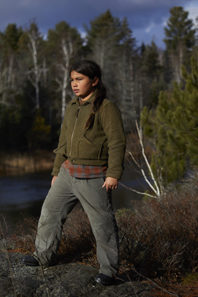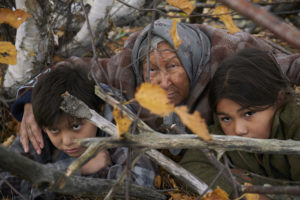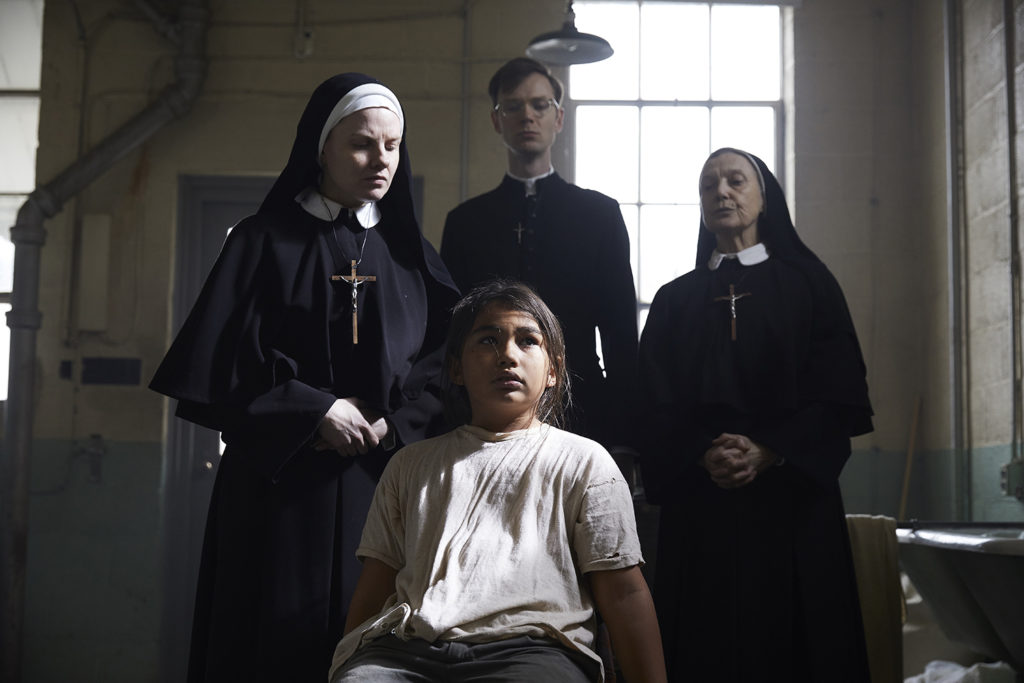
We’ve all heard the phrase, “You can’t know where you’re going until you know where you’ve been.” For many generations of First Nation people, knowing where they’ve been wasn’t an option. In the 19th century, the Canadian government created a policy called “aggressive assimilation.” The program was meant to “educate” and “care for” aboriginal people living in Canada. In other words: Whiten them up. Director Stephen S. Campanelli’s biopic, Indian Horse, recounts the life of a man who endured that broken system. Campanelli’s film adapts one person’s story to humanize an atrocity of incomprehensible scope.
Residential schools were government-sponsored religious schools meant to assimilate indigenous children into Canadian culture. Beginning in the 1800’s and operating until 1996, 150,000 First Nation, Inuit, and Métis children were removed from their communities and forced to attend residential schools. But here’s the kicker: These kids became Catholic, forgot their native language, and shed their culture, but remained outsiders. Pushed to the fringes of society and with little understanding of their historical traditions, these men and women became drifters in a cultural no man’s land.
Early in the film, our young protagonist Saul (Sladen Peltier) gets ripped from his dead grandmother’s arms and hauled off to a residential school. We’re introduced to his new life with a blunt visual metaphor. Upon arrival, nuns cover him in a thick white layer of delousing powder and throw him in a bathtub, scrubbing away at his brown skin. If the nuns had their way, the white layer would be permanent, and his Ojibway heritage would spill down the drain on a raft of soap suds. Things don’t get any easier for Saul. He and his fellow students face constant verbal and physical abuse at the hands of the adults running the school.
Saul finds his salvation in the game of hockey, even though he’s too young to play with the older boys. Every morning before dawn, Saul sneaks off onto the ice and practices, using frozen horse turds instead of pucks. By the time people figure out what he’s been up to, he’s leagues better than the kids at his school. Jump ahead several years and Saul’s (now played by Forrest Goodluck) talent creates opportunities for him that don’t often come an Ojibway kid’s way. But even as he rises through the hockey ranks, he confronts racism on and off the ice. As competition intensifies, signs of Saul’s abusive past surface, hurting his chances of achieving his dreams.
Indian Horse tells a simple but effective story. Campanelli constructed the film on a foundation of broad characters and blunt themes. Granted, this is a biopic and it’s hard to flesh out characters when the story spans 30-years in less than two hours. My biggest problem is with how black and white everything feels. A couple of callous G-men drag Saul off to school, nuns and priests are full-on monsters, and most white people wear their racism like a badge of honour. It feels like a finger-wagging parable rather than a nuanced tale of a real person’s life
Dennis Foon ‘s script doesn’t ask much of the cast. The film divides Saul’s life into three roles played by Sladen Peltier, Forrest Goodluck, and Ajuawak Kapashesit and they all bring something unique to the character. Young Saul is the kind of ebullient kid who would be right at home in a show like Stranger Things. Aside from his youthful charm, he has an innocence that makes his pain and suffering even tougher to watch. Teenage Saul is filled with angst. He hasn’t yet made sense of the world but he’s grown to resent it. By the time Saul reaches adulthood, he’s suppressing a lifetime of anger. His eyes betray a smouldering rage waiting to be unleashed. Other characters pop in and out of Saul’s life but they’re mostly unremarkable bit players.
Cinematographer Yves Bélanger helps jazz up Campanelli’s straightforward storytelling approach. They’re always looking for the best way to convey information with their visuals (like placing the camera on the tip of a canoe as it cascades through some rapids). Campanelli also does an excellent job shooting the action on the ice. It’s baffling how often TV and movie directors fail to capture a sport’s essence. Indian Horse doesn’t have that problem. Hockey is a chaotic game but Campanelli translates the sport’s frenetic pace in a way that doesn’t confuse the viewer. It’s easy to appreciate the speed, skill, and artistry on display. Even viewers who don’t follow hockey will get why people marvel at Saul’s talent.
There is a difference between knowing something and feeling it. You can read that 150,000 children were forced into residential schools and then go on about your day, flicking through your Instagram feed like nobody’s business. But comprehending what happened and then actually feeling it is a different story. Feeling it is like having hot stones sinking down in your belly. Feeling it hurts, and it’s scary, and it can ruin your day. Indian Horse doesn’t just want you to know about residential school’s sketchy past, the movie wants you to understand its toll and then feel it. We are asked to sit through uncomfortable scenes where children are degraded, beaten, and locked in cages and I haven’t felt so unsettled by a story since watching 2017’s The Handmaid’s Tale.
The beauty of Indian Horse is that it humanizes a story that people are apathetic towards. The scope of the residential schools’ damage is too vast to comprehend so the film compresses the atrocity into a single relatable story. Even though I wasn’t impressed with Indian Horse’s style of storytelling, its powerful message left me devastated.
- Release Date: 4/13/2018


